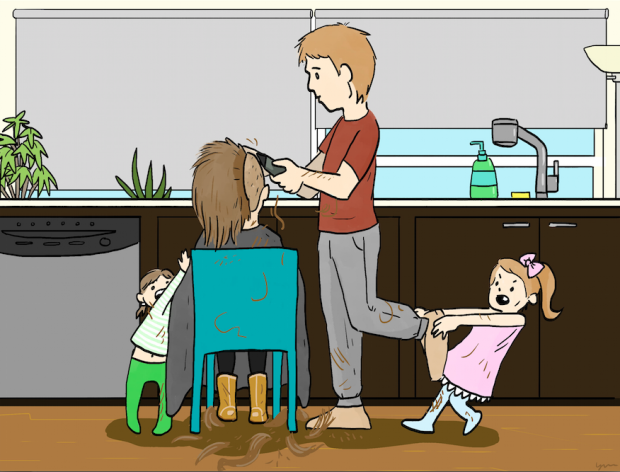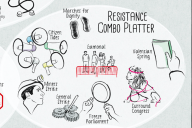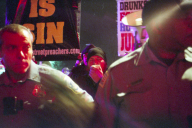On motherhood—and inhabiting your body (and your writing) in a new way.
In the past few months, our older daughter has become obsessed with asserting herself as a girl. Because she’s almost three, and not eleven or fourteen, I mostly only find this sweet. She wants always to wear dresses. She wants purses. Fancy shoes. I am a woman who has worn mostly boy’s or men’s clothes my whole life. I wear girl’s clothes now, but pants and button ups, neutral tones, one or two sizes too big. I let my husband cut my very short hair in our kitchen with a buzzer and not-so-high-quality-scissors. I wear mascara once or twice a month.
We’re girls, mommy, my daughter tells me, when I ask her what she wants to wear every morning. Girls wear dresses. She lets her eyes settle a minute (or I imagine this? or this is me, thinking maybe I’m not enough or the right kind of mom) on my too big shirt, my jeans. My daughter doesn’t though, mercifully, insist I change. She tests the twirl-ability of her dress. I dress her sister (in pants still, because she can’t talk yet). We start our day.
Our daughter has also, in the past few months, become obsessed with every character we read about being female. No, mommy, she says to me—each time she’s hears a he—she’s a girl. Many of the main characters of our children’s books are not female. There are, inevitably, male characters in almost every book, but our two year old wants all of them to be shes.
Perhaps the better choice here would be to explain to our daughter why and how these characters are not girls. But I am the sort of mother who is charmed by this choice, who is, in this instance, willing to give in.
I didn’t know how to fix the problem of all this maleness at first, how to turn all the characters we read about each week from boy to girl. There are so many moments in which the characters seem to assert the particularity of their maleness: crowned kings, becoming fathers, fighting wars. But our daughter does not consider any of these qualities as detracting from these characters’ abilities to be female. I change all the hes to she and our daughter’s satisfied. She nods and smiles, pats my arm.
![]()
I was a runner in high school. I was the sort of regional small town successful that got me in the local newspaper and would eventually evoke some passing interest from a few colleges. I was also female. Also, pretty seriously depressed.
The last was the least obvious, and, of course, the one that felt most sure to me. I continued to do well in school though. I won races. I kept wanting and sometimes succeeded in acquiring the attention of cute older boys. I was sure then that if I acquired the attention of the right sort of boy, if I could keep his attention long enough, that maybe I would tell him how I was really feeling, maybe then he’d be willing to endure the things I said. This is, of course, the most classic of teenage girl feelings. I wanted a boy to love me enough to save me. I still thought saving was a thing. I thought sex could function as some ultimate commodity—maybe the only thing of value I possessed. If I could find someone who wanted to fuck me, maybe then they’d help me. Maybe then I’d be okay. Even typing this, remembering this, I want to scream at my younger self to open up to my girlfriends, but I understood then, right or wrong, that my feelings were too much to ask someone to take without having anything to offer back. The only thing I thought I had to offer then was sex.
The only other commodity that anyone but me seemed to value was my speed. I ran and ran and teachers let me leave class early to stretch before practice. My parents bragged. Kids at school who’d never looked at me knew who I was and asked about my meets.
I was, in other words, all body. I was what I could do with my arms and legs, what I could give up. I lost races though as well as won them. I was good, but I was not great. I was not the most attractive girl at my high school, not even close to it, so as much as I hoped I could find a boy who’d listen as long as I let him fuck me, no one offered. Once, I thought a boy on the track team might kind of like me, but then I accidentally beat him in a workout. I understood after this I was no longer likable like that to him.
I felt completely without options. I got thinner to get faster. I thought if I were smaller, boys might like me more. But the limitations of my body were clear and unrelenting. I wanted to scream and yell and be anything but just my body. I wanted someone to acknowledge all the other things I thought I was.
I started eating junior year of high school. I ate aggressively, voraciously. I ate more and I ran less. I was less than one hundred pounds when I started eating. I was all bone and sinew, then I wasn’t anymore. In a few months I’d gained half again my body weight. I was and was not in control of this. I see it now as an assertion of my right to want things, an assertion of my right to be nourished, to be filled. But it was also an assertion that did not often feel as if I had control over it. I’m not sure who—at 2:00 AM, sneaking quarts of ice cream into my bed and hiding the detritus the next morning, feeling so sick most days from the pounds of food that I felt the blood pumping too hard through my body, the constant, churning stomach aches—I was. I got both slower and less attractive. I knew full well these were the two commodities, however limited, I had that the world might be interested in, and I obliterated both.
Maybe this was an assertion of how, even in the face of these qualities that may have been, in abler hands, forms of power, I still only ever felt acted upon. Maybe I wanted someone to come prove to me that there was something fundamental that might be appealing, valuable, that still existed after all of this had been done away with. I ate because all anyone seemed interested in was my body, because what it had, what it could give, seemed the only reason people looked. I wanted to reduce myself down to only what was not my body. I wanted somebody to see, acknowledge, maybe even help, whatever else that I might be.
![]()
Once, in graduate school, twelve years and a husband after those high school years, I went to dinner with a male professor. I was pregnant, as I was for nearly all of graduate school. This leant a newness to my interactions with males. I could be brasher. I could get as excited as I wanted, be as interested as I liked. I had this sign along my stomach that screamed “non-sexed being,” even, of course, as I was the most sexed I’d ever been. But solidly entrenched inside my pregnancy, I could have conversations without my constantly considering whether someone thought what I’d said was some kind of not so subtle attempt to get them to acknowledge that I was also capable of offering them sex.
I spoke at this dinner, in all of graduate school, like I maybe never had in my life. I often said exactly what I thought and what I wanted. I espoused opinions, excitement, interest. I apologized much less. I felt a power that I associated then with having finally found a space in which my ideas were interesting or acceptable, but, now, having not been pregnant again for a while, I realize also how the absence of some of my possibilities as a body helped.
I remember waiting to meet a friend at a bar not long after I’d had our first daughter. I had my breast pump on the floor in front of me, wedding ring still prominent on my left hand. I was still saggier than I’d been in years. But it was winter, the bar was dark and my breasts were full with milk. I talked to the guy next to me for twenty minutes before realizing he wasn’t actually interested in anything I’d said. I was sad then, that night, realizing I was sexed again.
![]()
The summer after my sophomore year of college, I was admitted to a novel writing class after I submitted pages of my spewing feelings to the instructor. I’d spent the past two years doing almost nothing but reading. These pages were my attempt at talking back.
The class was mostly grown ups. Then, everyone around me seemed more grown up than I. It was a general education class and most of the students were in their thirties, fifties, professionals. There was one other girl close to my age in that class, but even she—twenty-two, a bartender at the roughest bar in Cambridge—felt miles from whatever it was I was.
The novel was me talking. I thought then that maybe there was more to it, that I should get almost limitless credit for the fact that I was telling what I thought then was a necessary truth. It was me screaming at the page and hoping someone would listen. It was me begging to be heard. I’d read enough novels written as rants to know that I might just be able to talk at my reader, if I did it beautifully, if I said something of worth. I didn’t fully appreciate yet the amount of work and care that might be necessary to make art out of a rant, but I knew enough about the world, perhaps, to structure all my ranting around a more tangible event.
The chapters of my novel alternated, every other, for some hundred and fifty pages, between a girl (basically me) talking endlessly about her feelings, and that same girl (not me at all because I hardly ever left my dorm room) administering a blowjob. I had, in other words, at the age of eighteen, somehow come to understand that my ideas were only interesting, only acceptable and worthy, when they were scaffolded on sex.
Even the specificity of this device was stolen. I had fallen deeply for Susan Minot, who had, much more brilliantly than I ever could, written a novel that is similarly built. But the device failed in my possession. The character in the novel was claiming to be in control in that moment of submission, but she wasn’t; the story was uneven and unclear. It (I) was too desperate, too anxious, too not-yet-formed.
![]()
A couple of weeks after we found out I was pregnant with our first daughter, I went to the man in the East Village who’d been cutting my hair for the past year. I remember sitting staring at myself and trying to see if I could see her forming on me, if my face was different, if I looked more full. This was the most time I ever spent looking in the mirror, getting a haircut, and while I usually avert my eyes as much as possible, this time I looked at myself full on.
My hair then was the shortest it had ever been. The guy who cut it used a buzzer for a good portion of my head. There was a little lift on top that helped to mitigate my face’s roundness. But it was, objectively, not the most attractive cut. My eyes are too small and my features too blunt to look pretty with hair that short. I looked bare, a little bit abrasive, not pretty, or traditionally attractive, but specific, I thought, interesting.
As our baby grew inside me I decided I wanted to grow my hair out long again. I like drastic change and was feeling in the mood for lots of it. A couple of months before she was born, with both girls actually, I ordered a handful of new clothes in my pre-baby size on the Internet, a dress, more color. I claimed I was more interested in my body then, now that I knew what it was not to have it, what it was to truly be unsexed. I resolved to dress more thoughtfully, to maybe try more for prettiness.
![]()
In grad school, there were loads of pretty girls. It was art school, and they shone. They wore dresses daily and had interesting, slightly asymmetrical hair. They were smart, articulate, thoughtful, and earnest. A handful of them became some of my closest friends. There were many points in the three years we were together that I envied these girls. The way the male professors looked at them, the way our male colleagues perked up when they came in a room.
One of these girls in particular—we did not become close—seemed to inhabit her pretty, her sex (there were plenty of girls who might have been empirically prettier, but she lead with her sex) in a way that shone through even what she wrote. I envied her not only because of all the attention that she garnered. I envied her because it worked. Because her writing was powerful, seductive. Because even as I tried to dismiss the way it was all dripping with a sexuality I wanted to believe was not as valuable as other qualities, I fell hard for it, I had to acknowledge its extraordinary pull. She owned her sex, inhabited it. She exploited its full force.
I stayed up reading my work next to hers each time I got a glimpse of it. My work felt the way I felt when I stood or sat next to her in class—cloying, ugly, desperate. It (I) felt like not enough.
![]()
I took a class on motherhood and writing just weeks after I found out I was pregnant the first time. You cannot, the professor said almost every class, reject the body. We read Ina May Gaskin, Lidia Yuknavitch, Charlotte Perkins Gillman, a book of poetry called HOME/BIRTH. Intellectually, I was astounded by these women. I spoke aggressively in class about the ideas they asserted, how right and good I found their work. You cannot deny the body, our professor said again. I looked down at my growing forming belly: I thought, that’s all I’ve ever done.
![]()
That dinner with my professor, I was pregnant with our second girl: he bought me fish and chips and paid for my cab home. I cannot, he said, in good conscience, put a pregnant woman on the subway late at night.
Also, though, that night: he told me I write like a man. You’re not afraid, he said, of misbehaving, of not being the sweet good girl. I understood this was meant to be a compliment. He was saying this in opposition to some writing we’d been talking about that he expressly didn’t like, writing that was pretty, well-shaped, had no bite.
I let it sit then. I nodded, smiled, ate my food. Because, maybe, I’m more well-behaved than either of us thought then. Because I was desperate then for validation, I was willing to take compliments even if they weren’t quite compliments to me.
What I was thinking though was no no no, how wrong he was, how little he must know of women. I thought I’m more woman, most woman, because of my bite.
![]()
For months after our first daughter was born—I’d had a C-section and was struggling with breastfeeding—I felt, not unlike I had in high school, as if my body was falling short; I felt as if I was failing to perform in a way that might garner love and support from those around me, to give to the one person in the world who was daily teaching me how intensely—how desperately—I could love. I wanted to bring all of the women who had ever made a baby home with me. I wanted all of us to be together to support and sustain one another; I wanted all of us to be able to tell the others all the ways that we’d already failed.
I didn’t get to bring all the women home, but I got to know a few in those months, in the years to come. I sat bleary-eyed, anxious, terrified and spoke to these women about every impulse, every secretion, every fear. I saw in each of them the extraordinary power of their woman-ness, crying, leaking, stitched and stapled back together: I saw their strength.
![]()
Over the three years we were in grad school, I found my footing as a mother. We had another baby, this time naturally. I fell violently, aggressively in love with both our girls. I fell in love also with my body, flaws and limits, lack of prettiness; I fell that much more in love with it because of this; this thing that held and birthed both of our babies, that nursed them. This thing that lugs them, and a stroller, and a diaper bag up our walk up’s steps. This thing that runs with them in the double running stroller, up hills and bridges, for miles and miles, puts them to sleep, leans over cribs and sings to them, loves them, loves them, loves them every day.
![]()
When I was about to finish grad school, another very wise professor asked me how my motherhood was informing my work. I was writing a novel about a mother and a daughter and my motherhood should have been informing every word, but I had not, until then, felt sure enough as a mother to inhabit it. Once he asked, I tried.
It still took more time after his asking. I wasn’t sleeping. Motherhood, not unlike serious depression, can be mind-numbing, it can dull the senses, it can make you question every thought or impulse that you’ve ever had. But, in direct opposition to depression, motherhood is also productive, it is also, unlike anything I’ve ever done, tangibly rewarding, sometimes almost totally engaging, filled with extreme unexpected pockets of extraordinary joy.
In becoming mother to our daughters, in learning what I was capable of with my thoughts, with my emotions, as well as bodily, I began to inhabit both my body and my writing in ways I never had. I began to be proud.
I was not the pretty girl, not seductive, but I was a different kind of body, a different kind of woman, writer, a different kind of strong.
![]()
A few weeks ago my husband cut my hair in the kitchen. For three years now, it has been long. He got out the buzzer at one point and made a few mistakes at what we thought might turn out to be layers. I have now, a single accidental errant bang. Our girls played on the floor and we laughed as both of them were covered in the remnants. Now my face is bare again. It is not a pretty haircut. It is me asserting, just as clearly as our daughter’s dress’s twirl-ability, the exact type of girl-ness, woman, person that I wish to assert.
_____________
Art by Yvonne Martinez.


















